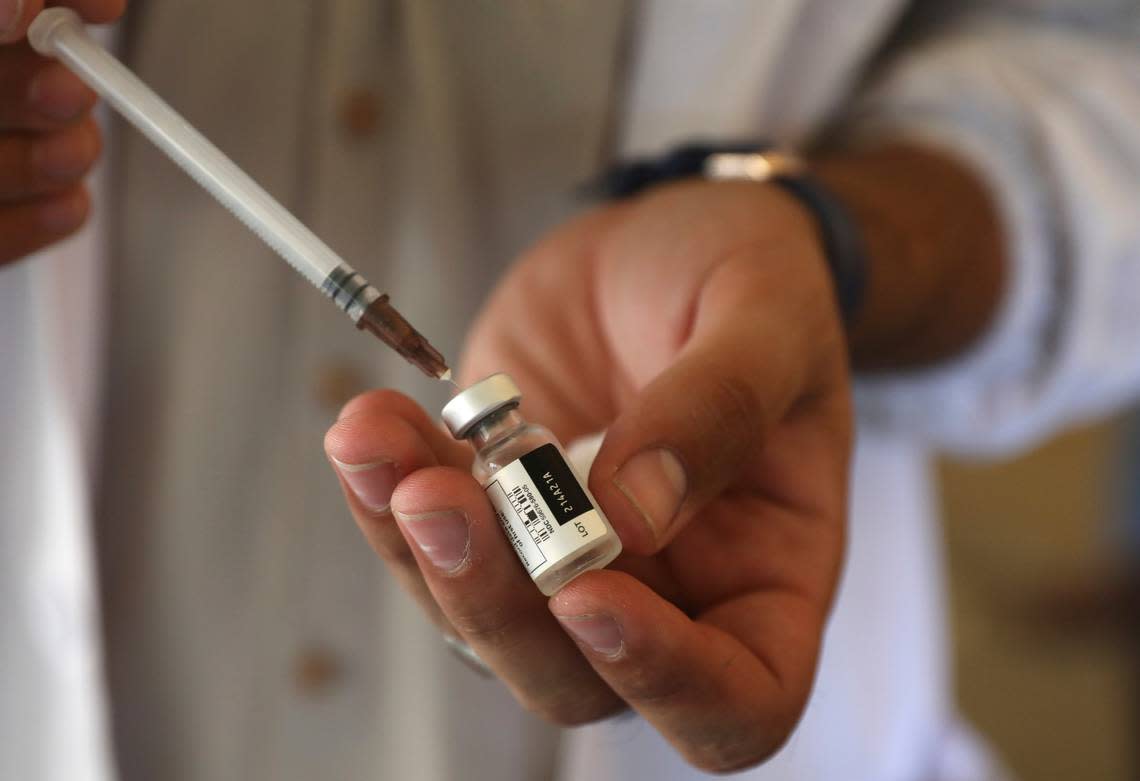Worried about COVID booster side effects? Here’s what to expect and why

Side effects following a COVID-19 vaccine are normal and should be expected, yet they aren’t guaranteed. While some people are delighted to have a pain-free vaccination experience, others may worry their lack of reactions is a sign the shot isn’t working.
No immune system is like the other, so some people may not experience side effects at all, even though their bodies are working just as hard.
The same thinking applies to booster shots, though data collected so far suggests your third shot may not be as intense as your second of the Pfizer or Moderna vaccines, or your single dose of the Johnson & Johnson vaccine.
“The safety data showed that serious adverse events after a booster dose are rare and, in general, people had fewer reactions after their third dose than after their second dose,” Centers for Disease Control and Prevention Director Dr. Rochelle Walensky said during a Nov. 22 White House briefing.
Fever, headache, fatigue and arm pain at the injection site are the most commonly reported side effects after a COVID-19 booster shot, which are similar to those felt after initial doses, the CDC says. Most reactions have been “mild to moderate. However, as with the two-dose or single-dose primary series, serious side effects are rare, but may occur.”
The U.S. Food and Drug Administration found that swollen lymph nodes under the vaccinated arm were reported more frequently after a Moderna booster compared to the first two doses of the same shot.
A CDC report released in September showed local reactions like arm pain to Pfizer booster doses were “slightly more common” compared to those felt after a second dose, while systemic reactions like fever and headache were less common after booster shots.
Anyone 16 and older can receive a booster shot at least six months after they received their second dose of the Pfizer or Moderna vaccines or at least two months after they received their single dose of the J&J shot.
Why do we feel side effects after COVID-19 vaccination?
Side effects after COVID-19 vaccination are expected, normal and a telltale sign your body is developing the protection it needs to fend off serious coronavirus illness.
The first shot of the two-dose Pfizer or Moderna vaccines floods your immune system with instructions that teach your cells to pump out harmless proteins similar to those the coronavirus uses to infect people. Meanwhile, special cells in your immune system recognize the proteins as foreign invaders and send signals to other immune cells to fight them off.
The end result is an army of antibodies that are primed to spot and kill real coronavirus proteins if your body ever encounters them.
The second dose, which repeats this process, is a firm reminder of the threat of infection by making the immune system work even harder to nail the fight down. This could explain why second doses tend to cause more intense side effects in some people.
Your third does it all over again, boosting antibodies to levels strong enough to continue protecting you against severe COVID-19.
Generally, younger people and women tend to experience more or worse side effects after vaccination than their older and male counterparts, studies have shown. Experts speculate younger people and women have more robust immune systems that react more strongly to the vaccines.
And beware of overthinking in the moments leading up to your vaccine appointment.
A survey of more than 550 vaccinated adults found people who expected to feel side effects were “much more likely” to experience them than those who did not anticipate the reactions. What’s more, expectation trumped other predictive factors known to influence the likelihood of experiencing side effects, such as the specific vaccine a person received, age and prior coronavirus infection.
Boosters may be necessary to fight omicron variant
Studies show antibodies from initial COVID-19 vaccine doses naturally wane over time. Now, emerging evidence suggests the new omicron coronavirus variant can evade vaccines to some degree and spread more rapidly than other variants, including delta, which is still the dominant version of the coronavirus spreading nationally.
“We’ve seen it compete pretty aggressively with the delta variant in other countries, namely the U.K. and Denmark, and we are anticipating that we will have more cases,” Walensky said in an interview with McClatchy. “It may well be able to outcompete delta. I think we’re still on the order of weeks. What we have seen in these other countries is a doubling time of omicron of around two days, which is really rapid doubling time.”
New data from South Africa shows two doses of the Pfizer vaccine offers 33% protection against omicron infection and 70% protection against hospitalization, according to the Associated Press. In comparison, two doses of the Pfizer vaccine offered 93% protection against hospitalization when the delta variant wave dominated the country.
Laboratory research from Pfizer, however, shows booster shots offer a 25-fold increase in antibody levels against omicron, similar to levels seen after two doses against the original version of the coronavirus. While two doses seem to lose some power against infection, the data suggests they may still protect against severe COVID-19, including hospitalization and death.


